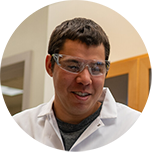Our 155-acre horticultural research farm operate by the NH Agricultural Experiment Station and the College of Life Sciences and Agriculture offers shared discovery space for crop development and management to benefit New Hampshire‘s agricultural sector. By being the Granite State‘s test farm for new ideas and innovations, it‘s a place where UNH research grows and makes a statewide impact.
The Woodman Horticultural Research Farm has been a UNH research facility since 1917, supporting crop and livestock research, teaching and outreach throughout its history. Today, approximately 30 acres of the farm are in agricultural research and production, with the remaining 125 acres having reverted to forest and wetlands. The farm is named for its original owner, Moses G. Woodman, and his executor sold the farm for research and teaching purposes to the University for “one dollar and other valuable considerations.”
The research farm has only two full-time staff but anywhere between 10–15 active research projects. To ensure their success and its applicability to New Hampshire farmers, the facility is operated using integrated management practices that enable its long-term sustainability and are typical of approaches used by many New England farms. The western side of the farm is operated using conventional practices and the eastern side is organically certified, providing for a greater breadth of research projects.
Projects at the research farm include crop production, plant breeding and environmental resilience. Recent and ongoing work focuses on developing new crops, improving yields and cold hardiness, assessing protected agriculture practices and improving integrated pest and disease management. Researchers are studying new varieties and management of kiwiberries, strawberries, buckwheat. eggplants, grapes, blueberries, sweetpotatoes, pumpkins and squashes, cover crops, post-harvest storage and beyond. Every year brings change to the research on the farm.
The wooded part of farm is used for research and teaching in areas such as forestry, wildlife biology, entomology and water quality. It also contains the equestrian cross country course. The farm hosts many visitors each year, and it is a frequent site of outreach programs for our agricultural initiatives.
Learn about the scientists and latest research at the Woodman Horticultural Research Farm below.
Getting Here
Contact
Evan Ford
Phone: (603) 868-2345
Email: evan.ford@unh.edu
Public visitation hours: 8:30 am – 3:30 pm, Monday through Friday.
70 Spinney Ln.
Durham, NH 03824
United States
CONDUCT RESEARCH AT THE FACILITY
With many users at our research farm, it is critical to ensure that we have knowledge of all ongoing and planned activities in order to ensure compatibility and to coordinate resources required to provide support and facilitation as needed. Importantly, we have responsibility for compliance with federal, state, university and local regulations, and to ensure safety for our staff, students, faculty and visitors.
To request the use of the Woodman Horticultural Research Farm, please complete the Woodman/Kingman Research Farm facility request form.
In the form, you will be asked to provide information about the proposed project well in advance, so that we can evaluate our abilities to accommodate your requested use of facilities and resources. For questions, please contact the Woodman Horticultural Research Farm manager, Evan Ford by email or phone, 603-868-2345.

Optimizing Crop Production in New Hampshire
Becky Sideman's research program takes an integrated approach to research and extension activities that focus on high-value specialty crop production and methods of extending the growing season for NH farmers. She is particularly interested in researching strategies to minimize production costs and ecological impacts, while producing economically viable yields of high-quality crops. Dr. Sideman's projects have focused on identifying new crops, cultivars and production practices, including season extension technologies, that expand opportunities for vegetable and berry production in northern New England.
Recently at the research farm: Dr. Sideman and research scientist Lilly Hartman has numerous projects at the research farm. Several long-term projects include the evaluation of seedless table grape varieties and training approaches, cold-hardy hydrangeas trials for cut flower production and overwintering figs in high tunnels. Other recent projects include the assessment of radicchio varieties for the cool-climate New England region, experimentation of eggplant varieties and cover crop management in high tunnels.
Click this link to learn more about Dr. Sideman's crop management research program

Bringing Underutilized Crops to New Hampshire
Iago Hale is always on the lookout for the hidden gems of the agricultural world. Hale is interested in the characterization, maintenance, and utilization of crop genetic diversity as means of enhancing small farm viability, rural livelihoods, food security, and ecosystem integrity. For Hale, crop improvement is fundamentally about increasing the options available to both growers and consumers within a context of dynamic market forces, increasing land-use pressures, and uncertain environmental factors.
Recently at the research farm: Dr. Hale leads the Kiwiberry Research and Breeding Program at UNH, founded in 2013 to develop elite varieties and best management practices to increase commercial potential of this under-utilized grape-sized, tropical-tasting fruit that is a delicious, nutrient-dense crop. A newer endeavor is In a recently begun Tartary buckwheat breeding program, which is assessing whether this promising underutilized crop would be a good fit for the northeast. Fast growing and highly drought tolerant, even in depleted soils, this gluten-free pseudo-grain boasts a rich flavor and impressive nutritional profile.
Click this link to learn more about Dr. Hale's breeding program

Finding Alternative Means to Grow Plants
Sazan Rahman is an agricultural engineer with a passion for Controlled Environment Agriculture. His research mainly focus on increasing the yield and quality of agricultural products using minimum resources and reducing environmental degradation with minimal carbon footprint by applying different innovations, optimizations, waste management and renewable techniques. Rahman's multi-disciplinary lab is intent to overcome each specific challenge of controlled environment agriculture, from the substrate to the roof cover and anything in between, through sustainable technologies.
Recently at the research farm: Dr. Rahman is building and testing alternative ways to heat greenhouses for small and medium-sized farms. His work focuses on using animal manure and composting the waste to generate heat, which is then used to maintain consistent temperatures in previously unheated high tunnels and greenhouses. The goal of the research is to further extend seasonal production in New England and, perhaps, reach affordable sustainable year-round production in New Hampshire and beyond.

Innovating Tomorrow’s Squash and Pumpkins
Led by Chris Hernandez, UNH’s cucurbit breeding program—North America’s longest continuously running pumpkin and squash breeding initiative—is advancing genomic tools and contemporary breeding methods to create new varieties with improved yield, disease resistance and nutritional content. The program has led to over 100 new variety releases, 50 exclusive licenses held by UNH and more than $2 million in royalties that continue to move this UNH research program.
Recently at the research farm: Dr. Hernandez and research assistant Renee Goyette are working to develop new varieties of these staple New England crops with improved characteristics like increased market yield, disease resistance and nutritional quality. With an eye on global agriculture, Hernandez plans to release breeding lines through commercial seed producers to farmers inNew Hampshire and around the world.
Click this link to learn more about Dr. Hernandez's cucurbit breeding program

Improving New Hampshire's Strawberries
Lise Mahoney is a plant geneticist who has been advancing the release of locally bred strawberries. Her goal is to be able to produce plants that can be used for ornamental purposes and organic production in cool climates. Dr. Mahoney has focused on breeding strawberries that produce not only on delicious fruit, but also rich foliage and flowers ranging from red to yellow and everything in between.
Recently at the research farm: Dr. Mahoney continues to cross multiple promising lines of strawberries, which will are transplanted for further assessment to the Woodman Horticultural Research Farm in the spring from the Macfarlane Research Greenhouses.
